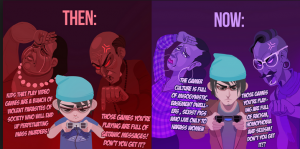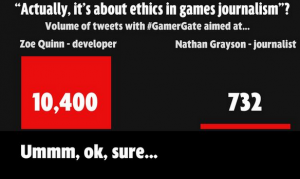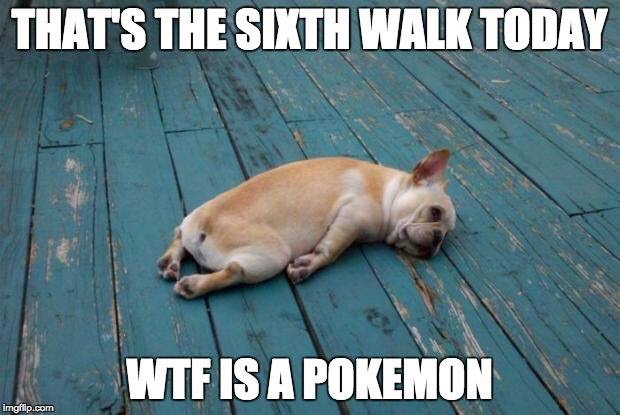Women have been long denied a voice in the gaming industry. This site, and others like it, have been fighting for years to establish a place where women’s voices aren’t only tolerated, but they are central to what it means to talk about games. Just because this site focuses on women’s voices doesn’t mean we don’t recognize the importance of male allies and male voices. Our male colleagues, and our colleagues who don’t identify as female, have been an important part of the fight against GamerGate, and this post seeks to recognize those voices.

GamerGate is not solely a feminist concern. It doesn’t just hurt women. GamerGate has worked systematically and intentionally to destroy the entire gaming community, piece-by-piece, person by person, since it’s disgusting inception. Yes, they primarily target women. But as women are 50% of gamers, and for countless other reasons, this hurts all gamers. Not only that, but GG works to block evolutions in the gaming industry that are more inclusive. For example, there has been much outcry about allowing for paths through games that are more story-driven than combat driven. This hurts no one, and still allows for combat-driven play, but only gives more options for more gamers. Yet there is continually outcry from GG folks about women ruining games and coercing developers. Why? GG represents a desperate clinging to the past. The gamers I know don’t want to see Duke Nukem over and over and over, even if it is nostalgic for some. We want and need evolution; we want and need to hold developers accountable for poor decisions, and we want and need to be critical of shitty, racist, sexist, homophobic games.
Some folks have been great about speaking against movements like GamerGate, owning up to the fact that games are indeed sexist. Some say that’s just the way they are, so get over it. Others say that the need in the industry to address the sexist content is akin to games simply growing up. True, at 13 years old, boys may not have a developed sense of respect for women. Parallelly, the games industry must get past its tendency to hand bikini pics on the wall and laugh at dildo jokes. The problem with this, of course, is that it reaffirms games as a male space that is only now allowing women in. There may have been truth to this idea at one point, but really that’s not how games work. At any point in the history of the gaming industry, the tech industry, computer industry, you can find women being the backbone of new technology. Women made games in the beginning. Women played games in the beginning. It wasn’t until later that something happened. The idea of GG as getting back to some ideal is flawed because a women-less gaming world never existed in the first place. The question of why our voices have been systematically silenced and we have been systematically harassed is a good question, in light of this. But, I digress. The idea of this post is to show just how GG is damaging for all players, and how harassment and sexism in the industry is not solely a women’s issue.

In this spirit, I have collected stories and perspectives from allies of NYMG about GamerGate. I asked them to relay their experiences with GG, their opinions of it, and their response to sexism in games in general. I hope you all enjoy reading these as much as I did!
Adam
“Gamergate as a movement has failed–it’s derided by the games industry, gaming journalists, and by most decent gamers and non-gamers alike. But while the media attention to the group has dried up, harassment of women, POC, and anyone who speaks against their group on Twitter or Reddit continues.
So what’s the deal with fighting this losing battle? They’re not going to silence the myriad indie creators stretching the boundaries of what subject matter is allowed in games. They’re not going to turn back the clock on the call for more women and POC as main characters in games. They’re not going to change the fact that women make up a majority of gamers nowadays.
We all remember why Gamergate began, right? A guy spreading lies to get back at his ex, a prominent indie game creator. The group has never been more or less than an attack on women gamers. Forgetting how the group started with petty libel fits perfectly into the Gamergate ethos of revisionist history that hides the fact that women and POC have been a part of video gaming since the beginning. And the industry is stronger because of it.
As an ally I can jump into any discussion with a Gamergater and not get half the vitriol that a women receives by refuting their claims. The best thing we can do is continue to push back and call out sexist attacks, support creators making the content we want to see in games, and fight the trolls where we can. It’s why the work of NYMG, Anita Sarkeesian, and countless other women and POC gamers is so important. The media has moved on from Gamergate because they’re fringe, they’re fighting a losing battle. But that’s just pushed this shit off most gamers’ radars. And onto the private pages, youtube comments, etc. of prominent women gamers, streamers, and journalists.”
‘Tacious
“I find gamergater’s arguments of “ethics in journalism” particularly interesting given my own previous experience as a reporter. The relationship between gaming magazines and video game companies is the relationship between journalism and advertisers writ large–you have a medium transferring from print to digital and nobody seems to know exactly how to monetize it. The field of journalism is still holding on to an outdated mode of monetization, but with fewer and fewer companies relying on print advertising, the money pool ins quickly shrinking. But to make the argument that gamergate is about ethics in journalism is to obfuscate the real issue: the treatment of women in games. The fact that the same ethical standards didn’t apply when the personal info of these women was published online is a testament to that fact.”
Dr. R
“As a lifelong gamer, I’ve always felt gaming culture and the games industry got a bad rap. Because of games’ roots as a niche subculture with a “young” audience, misconceptions that may have been true 30, 20, or even just 10 years ago persist today. Despite the industry’s growth, in terms of audience, technology, and revenue, many in popular culture erroneously associate gamers with kids, the socially awkward, and—in some political circles—brainwashed sociopaths. Mainstream media has trouble recognizing this burgeoning medium as having surpassed other, more traditional media, as art. It’s both laughable and frustrating to see game coverage be done “wrong” by mainstream media. They mispronounce names, mix up terminology, make gross generalizations, and get facts wrong.
For those who self-identify as gamers, for whom gaming more a passion than merely a way to pass the time, this “bad rap” reinforces the need for games journalism done well: for writers, critics, and personalities to get it right. Moreover, because many gamers grew up during a time when playing games was less socially acceptable, we tend to band together when we (or our passion) is threatened. What we perceive as a threat, however, is undefined. When we hear about questionable ethics or integrity from the games journalists or games outlets who we rely on to “get it right,” it’s natural to be upset. And when we hear of people critiquing, challenging, and changing (or attempting to change) the industry we so closely identify with, it’s natural to be defensive.
What is entirely, unequivocally unacceptable is the manner in which many #gamergate’rs have responded to questions of journalism and—more importantly—critiques and challenges to the industry. Attacks on women, on people of color, on critics, on allies of any of these, and so on, in the name of protecting a passion is abhorrent and contemptible. Attacks on anyone over games is awful. When a movement uses journalistic integrity or an impassioned defense of the status quo as a mask/excuse for death and rape threats, for doxing and harassment, that movement becomes the antithesis of what I envision gamer culture. Games are meant to be fun.
Gaming culture is all about shared experience and interest, bonding through play. Most gamers who have met new people only to find that that person also plays games have experienced this common ground. It’s an immediate bond. You get me, because you play too. Games culture is meant to be inclusive, social. If we want to be taken seriously, we need integrity and ethics—not simply in our journalism, but in our actions as a community. So, pass the controller and ready player 2, because we need to welcome those who share our interest in games, even if they disagree on how the industry should change.”
Alex
I hope you all enjoyed the perspectives. I know I find it heartening to know that gamers in all shapes, sizes, and colors can unite against something as disgusting as GamerGate. There is hope for us yet! Have a good weekend!




